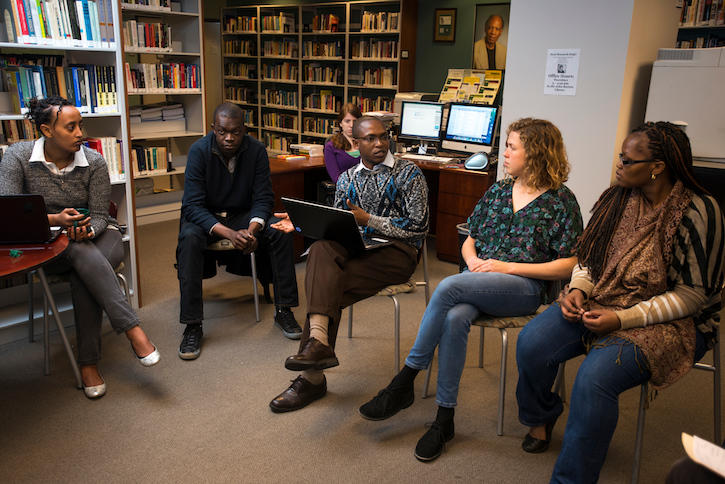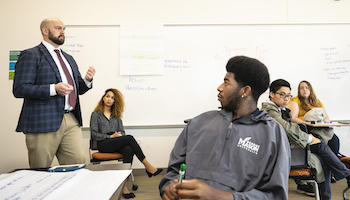A new Fellowship for Genocide and Mass Atrocity Prevention will bring 12 students to the Carter School.
Contact Us
703-993-1300
Admissions: tcsinfo@gmu.edu
Advising: tcsadvi@gmu.edu
This 33-credit professional program prepares students for practice and further academic work to promote peace and facilitate conflict resolution.

Graduate Students study together in the John Burton Library
Our alumni work in government agencies, international peacebuilding, humanitarian and development organizations, private businesses, unions, community centers, educational institutions and other settings where conflict analysis and resolution skills are in demand. Students study theory, methods and ethical perspectives of the peace and conflict studies field and apply this knowledge in simulations, workshops, field practice, and internships. Based on their goals, students select one of six different concentrations, including the option to design their own. Students may enter the MS program in either the fall or the spring. Students can study either part-time or full-time, with many classes offered online. Students may choose to enroll in the program fully online. Students may also add a graduate certificate.
Concentrations allow students shape their own course of study to match their professional goals
Peacebuilding
Become a professional peacebuilder. Learn in-demand skills, such as monitoring and evaluation, conflict assessment, and program design. Ideal for students seeking a career in government, international organizations, or NGOs focused on working in divided societies.
Social Justice Advocacy and Activism
Campaign to end injustice. Learn the analytical and leadership skills needed for activists in the United States and abroad. Perfect for students interested in working for NGOs and community organizations focused on critical social issues.
Dynamics of Violence
Prevent violent conflict. Learn the origins of violent conflict and policies to prevent and mitigate its effects. Ideal for students seeking a career in NGOs and government agencies that reduce violent conflict around the world.
Inclusive Conflict Engagement
Bridge divisions within societies and organizations. Learn the skills needed to resolve conflicts both internationally and at home. Perfect for students seeking to become mediators in diverse settings, including communities, governments, and private organizations.
Media, Narrative, and Public Discourse
Transform conflict stories. Learn how to analyze and reconcile people's conflict narratives. Ideal for students seeking a career in mediation, public media, or communications.
Conflict-Sensitive Development and Resilience
Bolster economic development in conflict-prone contexts. Tailor humanitarian and development programming for countries recovering from violent conflict. Perfect for students working for aid agencies and international organizations focused on international development.
What makes the MS program at the Carter School for Peace and Conflict Resolution innovative and unique?
- Concentrations allow students shape their own course of study to match their professional goals.
- Students hone their research and practice skills through local and international field-based courses.
- Students work closely with faculty who are engaged in innovative scholarship and practice in peace and conflict studies.
- Experiential and project-based learning allows students to explore and reflect on the complexity of conflicts and the challenges of conflict resolution and peacebuilding.
- By engaging with real world problems, student learn how to identify and select appropriate practices as advocates, scholars, analysts, conflict resolution practitioners and peacebuilders.
- Students acquire a solid grounding in theory and practice and learn the newest ideas in the peace and conflict studies field.
- Centers, Programs, and Projects housed at the Carter School allow students to engage with faculty and each other through research and practice projects on peace, conflict and conflict resolution.
- Small, dialogue-based seminars allow students to work closely with faculty.
An accelerated master's option is available to students in the bachelor's program.
Opportunities to work in the field
Our location in Arlington, Virginia, just four metro stops from downtown Washington, D.C., allows students to take advantage of the many resources of the nation's capital. They include internships in federal, state and local government offices, non-governmental organizations, advocacy networks, international organizations, and the private sector. Alumni living in the region and other parts of the world provide students with additional opportunities for networking and collaboration. Employment opportunities could include:
- Aga Khan Foundation
- AMIDEAST
- Better Business Bureau
- Community Building Institute
- District of Columbia Mayor's Office on Community Relations
- District of Columbia Public Schools
- Environmental Protection Agency
- Fairfax County Public Schools
- Food and Drug Administration
- Human Trafficking Institute
- International Foundation for Electoral Systems
- National Consortium for the Study of Terrorism and Response to Terrorism
- Saferworld
- Save the Children
- Search for Common Ground
- United Nations
- U.S. Agency for International Development
- U.S. Department of State
- U.S. Federal Bureau of Investigation
- U.S. House of Representatives
- U.S. Institute of Peace
How to Apply
Application Deadlines
Spring
- Priority Deadline for Merit Award Consideration*: November 1
- Standard Deadline: January 4
Fall
- Priority Deadline for Merit Award Consideration*: February 1
- Standard Deadline:
March 15(Extended to July 15) - Space Available (Int’l): July 15
- Space Available (Dom): August 1
*Please contact the Admissions Coordinator for details
Application Instructions
You will submit all items required for the application through your application portal. Admissions requirements include:
- A completed Online Application for Graduate Study.
- The goals statement should answer the question: "How has your past experienced prepared you to engage in conflict, and how will this program equip you for your future?" There is no length requirement.
- The two letters of recommendation should be submitted electronically. Provide the name and contact information of your references, and a link will be emailed to them to submit their letters online.
- A baccalaureate degree from a regionally accredited institution of higher education or international equivalent must be verified from official transcripts.
- A 3.00 GPA (on a 4.00 scale) or better in baccalaureate study. If you don't meet this requirement, you could be accepted provisionally.
- The application will require you to submit unofficial transcripts. In addition, two official copies of transcripts from each undergraduate and graduate institution you attended are also required. Transcripts must be in sealed, unopened envelopes to be considered official.
- A GRE score is not required, but may be submitted.
*Applicants with international credentials will need to submit additional items
Incoming Students
Send official transcripts
Official transcripts are required from all schools you have attended. Please ensure these are sent prior to the first day of classes to avoid any registration holds.
Schedule your Advising Appointment
Students must make an advising appointment to before registering for courses. Please email Charisse Cardenas (tcsadvi@gmu.edu). These can take place either in-person, via Skype, or by telephone.
Set up your Patriot Pass account
To activate your new student PatriotPass account, you will need your G number, indicated on your admission email/letter, and CLAIM ID number, which is your birth month, day and year in 2-digit format (i.e., June 30, 1976, would be entered as 063076).
Register for classes
- Using your Patriot Pass login information, you will view the schedule of classes, then register.
- You should register and pay for your tuition and fees before the first day of class of each term.
- Review course descriptions.


